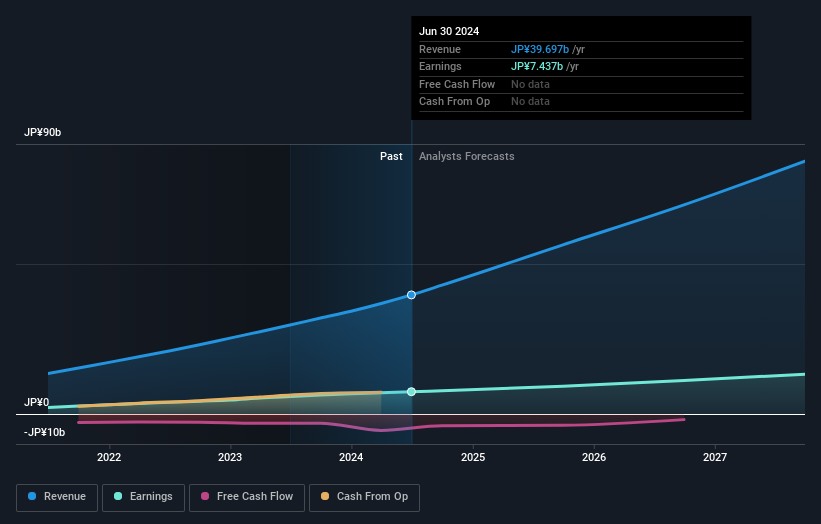- Japan
- /
- Healthcare Services
- /
- TSE:7071
After the recent decline, Amvis Holdings, Inc. (TSE:7071) CEO Keiichi Shibahara's holdings have lost 3.9% of their value

Key Insights
- Significant insider control over Amvis Holdings implies vested interests in company growth
- The largest shareholder of the company is Keiichi Shibahara with a 60% stake
- Institutions own 25% of Amvis Holdings
To get a sense of who is truly in control of Amvis Holdings, Inc. (TSE:7071), it is important to understand the ownership structure of the business. With 61% stake, individual insiders possess the maximum shares in the company. In other words, the group stands to gain the most (or lose the most) from their investment into the company.
As a result, insiders as a group endured the highest losses after market cap fell by JP¥7.8b.
In the chart below, we zoom in on the different ownership groups of Amvis Holdings.
See our latest analysis for Amvis Holdings

What Does The Institutional Ownership Tell Us About Amvis Holdings?
Many institutions measure their performance against an index that approximates the local market. So they usually pay more attention to companies that are included in major indices.
Amvis Holdings already has institutions on the share registry. Indeed, they own a respectable stake in the company. This suggests some credibility amongst professional investors. But we can't rely on that fact alone since institutions make bad investments sometimes, just like everyone does. When multiple institutions own a stock, there's always a risk that they are in a 'crowded trade'. When such a trade goes wrong, multiple parties may compete to sell stock fast. This risk is higher in a company without a history of growth. You can see Amvis Holdings' historic earnings and revenue below, but keep in mind there's always more to the story.

Hedge funds don't have many shares in Amvis Holdings. With a 60% stake, CEO Keiichi Shibahara is the largest shareholder. This essentially means that they have significant control over the outcome or future of the company, which is why insider ownership is usually looked upon favourably by prospective buyers. For context, the second largest shareholder holds about 5.1% of the shares outstanding, followed by an ownership of 4.7% by the third-largest shareholder.
While it makes sense to study institutional ownership data for a company, it also makes sense to study analyst sentiments to know which way the wind is blowing. Quite a few analysts cover the stock, so you could look into forecast growth quite easily.
Insider Ownership Of Amvis Holdings
The definition of company insiders can be subjective and does vary between jurisdictions. Our data reflects individual insiders, capturing board members at the very least. The company management answer to the board and the latter should represent the interests of shareholders. Notably, sometimes top-level managers are on the board themselves.
Insider ownership is positive when it signals leadership are thinking like the true owners of the company. However, high insider ownership can also give immense power to a small group within the company. This can be negative in some circumstances.
Our most recent data indicates that insiders own the majority of Amvis Holdings, Inc.. This means they can collectively make decisions for the company. Given it has a market cap of JP¥184b, that means insiders have a whopping JP¥112b worth of shares in their own names. Most would be pleased to see the board is investing alongside them. You may wish to discover if they have been buying or selling.
General Public Ownership
The general public, who are usually individual investors, hold a 13% stake in Amvis Holdings. While this group can't necessarily call the shots, it can certainly have a real influence on how the company is run.
Next Steps:
While it is well worth considering the different groups that own a company, there are other factors that are even more important. For instance, we've identified 1 warning sign for Amvis Holdings that you should be aware of.
If you would prefer discover what analysts are predicting in terms of future growth, do not miss this free report on analyst forecasts.
NB: Figures in this article are calculated using data from the last twelve months, which refer to the 12-month period ending on the last date of the month the financial statement is dated. This may not be consistent with full year annual report figures.
New: Manage All Your Stock Portfolios in One Place
We've created the ultimate portfolio companion for stock investors, and it's free.
• Connect an unlimited number of Portfolios and see your total in one currency
• Be alerted to new Warning Signs or Risks via email or mobile
• Track the Fair Value of your stocks
Have feedback on this article? Concerned about the content? Get in touch with us directly. Alternatively, email editorial-team (at) simplywallst.com.
This article by Simply Wall St is general in nature. We provide commentary based on historical data and analyst forecasts only using an unbiased methodology and our articles are not intended to be financial advice. It does not constitute a recommendation to buy or sell any stock, and does not take account of your objectives, or your financial situation. We aim to bring you long-term focused analysis driven by fundamental data. Note that our analysis may not factor in the latest price-sensitive company announcements or qualitative material. Simply Wall St has no position in any stocks mentioned.
About TSE:7071
Amvis Holdings
Provides nursing home, home nursing care, home care, in-home care support, and disability welfare services in Japan.
Adequate balance sheet and fair value.
Market Insights
Community Narratives




